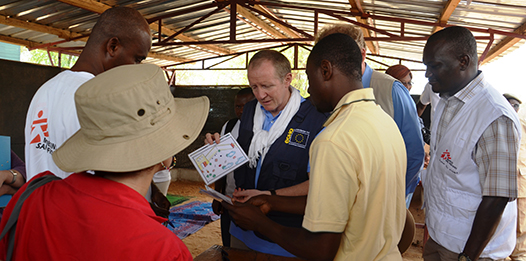
EUROPEAN UNION As the world’s leading humanitarian aid donor, the European Commission’s Humanitarian Aid and Civil Protection department (ECHO) dedicates nearly 15% of its one billion-euro budget to programmes seeking to improve access to water and sanitation.
According to ECHO, how important are the issues of drinking water, sanitation and hygiene to populations affected by humanitarian crises, and why?
Every year, nearly 300 million people are affected by disasters (natural or man-made). They then find themselves without access to drinking water or sanitation. More than 3000 children die every day form diarrhoeal diseases, and thousands of others suffer from malnutrition, aggravated by a lack of access to water, sanitation and hygiene (WaSH). More than 700 million people face chronic water shortages. By 2050, three quarters of the world’s population could be in a similar situation. This water stress exacerbates conflicts surrounding the control of natural resources and intensifies the phenomenon of population displacement. In Syria, when water supplies are cut off, population movement is almost systematic. This issue is a priority for the humanitarian work that ECHO finances to the tune of 15% of its annual budget.
What is the European Commission doing in those countries emerging from crises to help those affected move from the emergency phase to reconstruction and then development, particularly with regard to WaSH infrastructures? What are the future goals in this field?
The aid supplied by ECHO is impartial, and delivered in response to basic needs. We endeavour to work more effectively with actors from the development sector. With regard to other donors, co-ordination, consistency and complementarity are our guiding principles, with a view to avoiding the duplication of work, ensuring sustainability and maximising the impact of available resources. We collaborate particularly closely with the other departments of the Commission, and those of the Member States, on the implementation of a European policy which aims to strengthen the resilience of those populations affected by humanitarian crises. Some of these projects contribute to the construction and sustainable management of WaSH systems, highlighting innovative approaches and underlining the potential for replicating these methods on a larger scale.
Should a “water and sanitation” objective be included in the Sustainable Development Goals to be defined by the United Nations? Do you think that emergency situations should figure on that agenda?
Of course. The two activities are interlinked; one follows on from the other. It would thus be opportune to create a link between emergency action (humanitarian aid and civil protection) and sustainable development in 2015 and beyond (including at Sendai). Given the increase in humanitarian needs, which humanitarian agencies are struggling to meet, it is equally vital to strengthen development work in the WaSH sector. A specific WaSH objective would help ensure the visibility that the sector deserves, and thereby go some way to ensuring that future actions receive funding.
Biography : Claus Sorensen is DG of the European Commission’s Humanitarian Aid and Civil Protection department (ECHO), whose mandate is to provide emergency assistance to the victims of natural disasters or conflicts outside the European Union. This aid is delivered straight to populations in need, regardless of race, religion or political persuasion.
